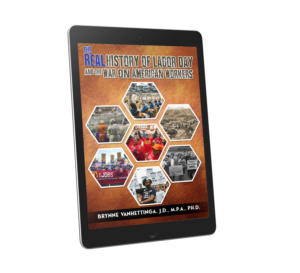THE GREAT JOBS DECEPTION: Why More Education Will Not Solve the Problem of Inadequate Jobs
 Americans are more educated than they have ever been. While both our aggregate educational levels and GDP have generally trended upward over the past few decades, most of us find we are either working harder for less or struggling to find appropriate work. As college and post-graduate education become ever more necessary to compete for a decent job, the cost of higher education is skyrocketing. Many young people and their families are beginning to question whether a college degree is worth the cost.
Americans are more educated than they have ever been. While both our aggregate educational levels and GDP have generally trended upward over the past few decades, most of us find we are either working harder for less or struggling to find appropriate work. As college and post-graduate education become ever more necessary to compete for a decent job, the cost of higher education is skyrocketing. Many young people and their families are beginning to question whether a college degree is worth the cost.
Those who do make the sacrifice to higher education may then struggle to secure appropriate employment and establish a foothold in a stable career. At the same time, mid-career professionals with years of education and experience who find themselves downsized or outsourced out of a job struggle to re-enter the job market. While most of these people eventually do find jobs, the new jobs often do not make full use of their education, skills, abilities and experience.
We never hear about this reserve army of underemployed, because the media and political establishments respond only to the voices of employers who loudly complain of a skills shortage crisis. Moreover, our labor statistics fail to measure both underemployment and job quality. All of this has thwarted a broader public discussion about how the job market is no longer working for many of us—either as individuals or as a society. Because there is no public discussion about the causes and consequences of underemployment, the underemployed view themselves as failures.
The Great Jobs Deception challenges the skills shortage alarmists and argues that the labor market is deliberately structured to produce an excess of a wide variety of skills. The objective of having a reserve army of skilled labor is to both cheapen and disempower it. This is compounded by the (mostly) unintentional complicity of higher education. Educational institutions must increasingly compete for students on the promise of making them “job ready.” However, education seems to have abandoned its higher purpose of producing citizens that are civically engaged and can think critically. In this manner, the system produces individuals with the higher-level technocratic skill sets to serve it, but without the intellectual resources to question or challenge it.
The Real History of Labor Day and the War on American Workers
Most of us realize that we are working harder for less, living with increasing precarity and less certainty about our working futures. We may attribute this to a post-Great Recession economy or the result of inevitable technocratic change.
What most of us don’t know is that a war against workers has been going on for over a century. In the beginning, worker submission was achieved at gunpoint and resisted by strikes, which often turned violent. This historical account analyzes the phases of worker subjugation, beginning with local conscripted mercenaries and formation of the National Guard. As workers became more docile, they were able to be controlled by less hostile methods. In these final stages, workers are kept in their place by a system of propaganda and popular discourse that encourages workers to see each other as the enemy. ebook format only]
Campaign Finance Reform: The Shifting and Ambiguous Line Between Where Money Talks and Speech is Free
Historical account of campaign finance reform efforts beginning with the 1925 Federal Corrupt Practices Act. Describes the tensions between alternating Congressional Acts and U.S. Supreme Court rulings to deal with the problem of money in politics. Analyzes the fallacies of the Citizens United decision while acknowledging that there are also real issues with the infringement of political speech. Proposes solutions that avoid (or make more transparent) corporate influence on the legislative process without running afoul of the First Amendment. [ebook format only]
Now Available: Good People, Evil Society

Are human beings inherently good or inherently selfish?
As most of us can intuit, people fall along a continuum. While each individual has personality traits that can tip them toward either prosocial or antisocial behavior and attitudes, the social environment and culture can also do the same. That is, we collectively co-create our social environment at the same time we are shaped by it.
Good People, Evil Society examines how a society can become dysfunctional even while most the individuals living within it are basically good and decent. We visit the findings of behavioral science, specifically Stanley Milgram’s electroshock experiments and Philip Zimbardo’s Stanford Prison experiment. We also analyze the work of Dr. Andrew Lobaszewsky, who conducted a psycho-social analysis while keeping his own mental sanity intact in Nazi and Soviet-occupied Poland. We incorporate behavioral science with the teachings of our major faith traditions in our attempts to understand evil.
Why Assholes Rule the World

Why Assholes Rule the World begins by reviewing the academic literature on assholes (yes, such a thing exists) to date. This is followed by findings from behavioral and social science research. What makes an asshole, and what motivates them? The analysis then expands beyond individual personalities to look at how power dynamics and hierarchical social structures facilitate asshole behavior.
Asshole behavior is aggravated by larger social and cultural forces. Austerity makes people anxious and desperate. Winner-take-all markets make people hyper-competitive. Cultural fragmentation and self-sorting destroys broader public trust and creates an us-versus-them mentality. Moreover, there are hard-wired and subconscious reasons why more of us don’t resist or challenge assholes. All of these psychological, behavioral, economic and cultural phenomena allow us to create a model that explains how assholes rise to positions of power.
Assholes tend to deliberately seek power, and having power aggravates asshole behavior. What we have today is a perfect storm of economic, ideological, and cultural factors that facilitates the ascendance of assholes. This negative feedback creates conditions by which even a small group of assholes can corrupt organizational ethics and national culture. Yet, there are proactive things we can do to help restore decent people to leadership positions.
More about books at our new site
Books 4 Thinkers!

